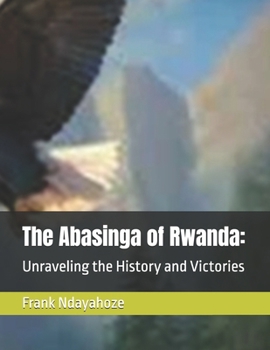The Abasinga of Rwanda: Unraveling the History and Victories
The simplistic Hutu-Tutsi dichotomy, so often employed to explain Rwanda's complex history, obscures a deeper, more nuanced reality. To understand Rwanda, one must delve beyond this binary framework and explore the rich tapestry of pre-colonial societies that shaped the nation. Central to this understanding is the Abasinga clan, a powerful and influential group whose history stretches back centuries, predating the colonial imposition of artificial ethnic categories. Their story challenges the conventional narrative and provides a crucial lens through which to view Rwanda's past, present, and future.
The Abasinga, whose origins are rooted in the fertile lands of present-day Uganda, represent a powerful example of a pre-colonial Rwandan social structure. Oral traditions, meticulously collected and analyzed over decades by researchers, point to a gradual migration southwards, driven by a combination of factors: population growth, resource competition, and perhaps even conflicts with neighboring communities. These migrations were not abrupt conquests but rather a slow, incremental process of settlement and integration. The Abasinga skillfully navigated the existing social landscape, forging alliances and establishing their own distinct kingdoms and chiefdoms across various regions of Rwanda.
Their geographic spread was extensive. Evidence from oral histories, corroborated by archaeological findings and the distribution of certain clan-specific customs and traditions, shows a presence in numerous regions. They were not confined to a single geographical area; rather, they established themselves in various locations, often forming close ties with other communities through intermarriage and trade. This widespread distribution underscores their significant pre-colonial influence across Rwanda. The Abasinga were not simply a localized group; their reach and impact were far-reaching. Understanding their geographic dispersion is critical to understanding the extent of their pre-colonial power.
The Abasinga's success in establishing themselves across Rwanda wasn't solely due to military might, though military prowess undoubtedly played a role. Their social structures and philosophy also contributed significantly to their influence. A remarkable emphasis on clan unity, a core value that transcended traditional socio-economic divisions, underpinned their political and social cohesion. This unity fostered a strong sense of collective identity, allowing the Abasinga to effectively negotiate alliances, resolve internal conflicts, and present a united front against external threats.
The clan's social organization was intricate, comprising numerous sub-clans, each with its unique history and traditions but all bound together by a shared sense of identity and purpose. This internal complexity didn't lead to fragmentation, however; rather, it fostered a resilient social structure. The Abasinga's unique approach to social organization, based on both kinship and shared lineage, allowed for a complex, nuanced society that was simultaneously unified and diverse. This internal diversity didn't weaken them; it enriched their social fabric.
Oral traditions highlight the importance of elders and lineage in maintaining social order. The elders acted as custodians of knowledge, tradition, and customary law. They were the keepers of the clan's history, resolving disputes and guiding the community through their vast knowledge of social norms and historical precedent. Lineage was paramount in the Abasinga social structure, tracing family ties back through generations. This emphasis on ancestral lineage fostered a deep sense of collective history and identity, further strengthening clan unity.
The Abasinga, whose origins are rooted in the fertile lands of present-day Uganda, represent a powerful example of a pre-colonial Rwandan social structure. Oral traditions, meticulously collected and analyzed over decades by researchers, point to a gradual migration southwards, driven by a combination of factors: population growth, resource competition, and perhaps even conflicts with neighboring communities. These migrations were not abrupt conquests but rather a slow, incremental process of settlement and integration. The Abasinga skillfully navigated the existing social landscape, forging alliances and establishing their own distinct kingdoms and chiefdoms across various regions of Rwanda.
Their geographic spread was extensive. Evidence from oral histories, corroborated by archaeological findings and the distribution of certain clan-specific customs and traditions, shows a presence in numerous regions. They were not confined to a single geographical area; rather, they established themselves in various locations, often forming close ties with other communities through intermarriage and trade. This widespread distribution underscores their significant pre-colonial influence across Rwanda. The Abasinga were not simply a localized group; their reach and impact were far-reaching. Understanding their geographic dispersion is critical to understanding the extent of their pre-colonial power.
The Abasinga's success in establishing themselves across Rwanda wasn't solely due to military might, though military prowess undoubtedly played a role. Their social structures and philosophy also contributed significantly to their influence. A remarkable emphasis on clan unity, a core value that transcended traditional socio-economic divisions, underpinned their political and social cohesion. This unity fostered a strong sense of collective identity, allowing the Abasinga to effectively negotiate alliances, resolve internal conflicts, and present a united front against external threats.
The clan's social organization was intricate, comprising numerous sub-clans, each with its unique history and traditions but all bound together by a shared sense of identity and purpose. This internal complexity didn't lead to fragmentation, however; rather, it fostered a resilient social structure. The Abasinga's unique approach to social organization, based on both kinship and shared lineage, allowed for a complex, nuanced society that was simultaneously unified and diverse. This internal diversity didn't weaken them; it enriched their social fabric.
Oral traditions highlight the importance of elders and lineage in maintaining social order. The elders acted as custodians of knowledge, tradition, and customary law. They were the keepers of the clan's history, resolving disputes and guiding the community through their vast knowledge of social norms and historical precedent. Lineage was paramount in the Abasinga social structure, tracing family ties back through generations. This emphasis on ancestral lineage fostered a deep sense of collective history and identity, further strengthening clan unity.
Format:Paperback
Language:English
ISBN:B0FHG4GZJM
ISBN13:9798292173946
Release Date:July 2025
Publisher:Independently Published
Length:232 Pages
Weight:1.21 lbs.
Dimensions:0.5" x 8.5" x 11.0"
Related Subjects
HistoryCustomer Reviews
0 rating





